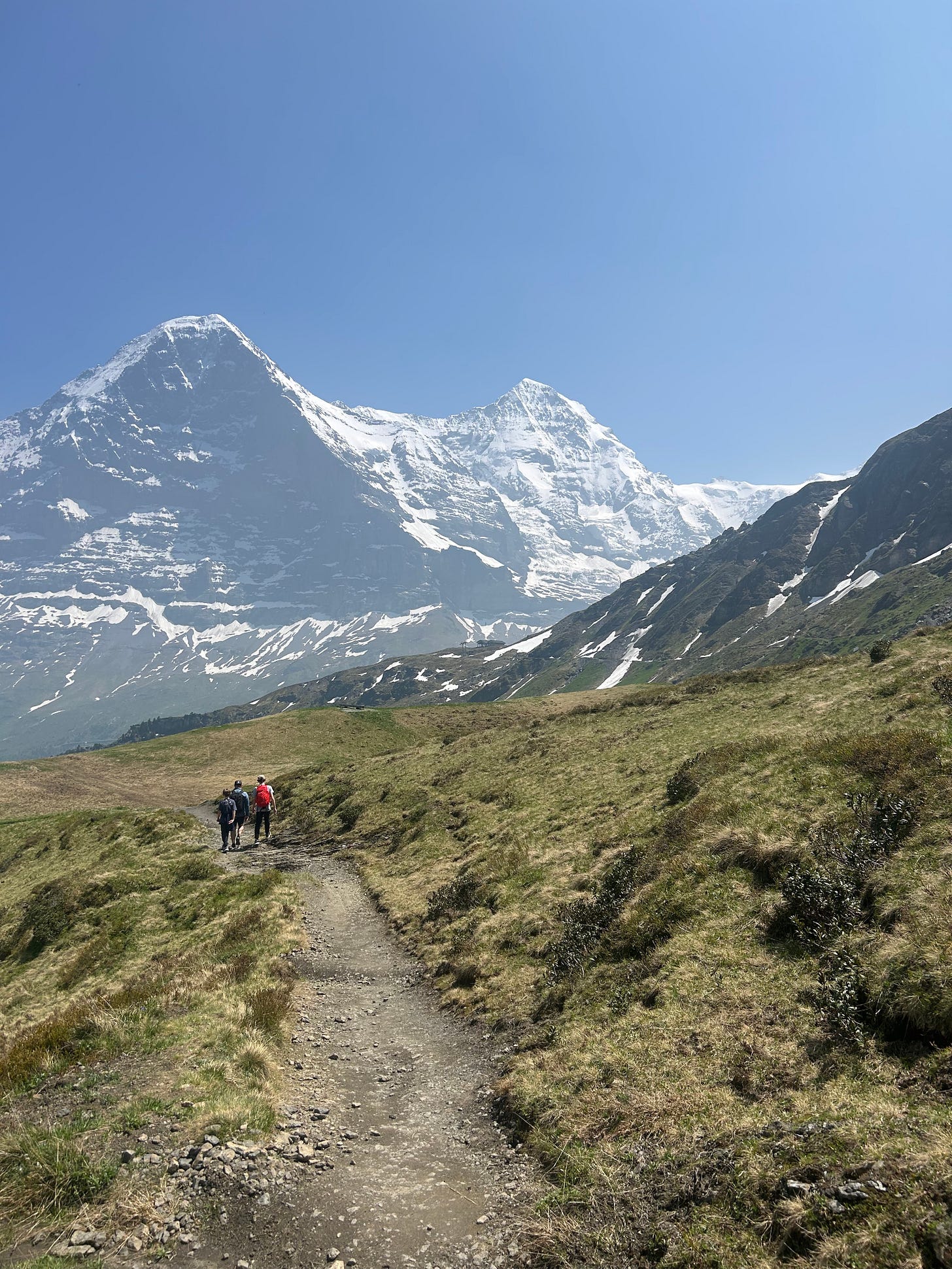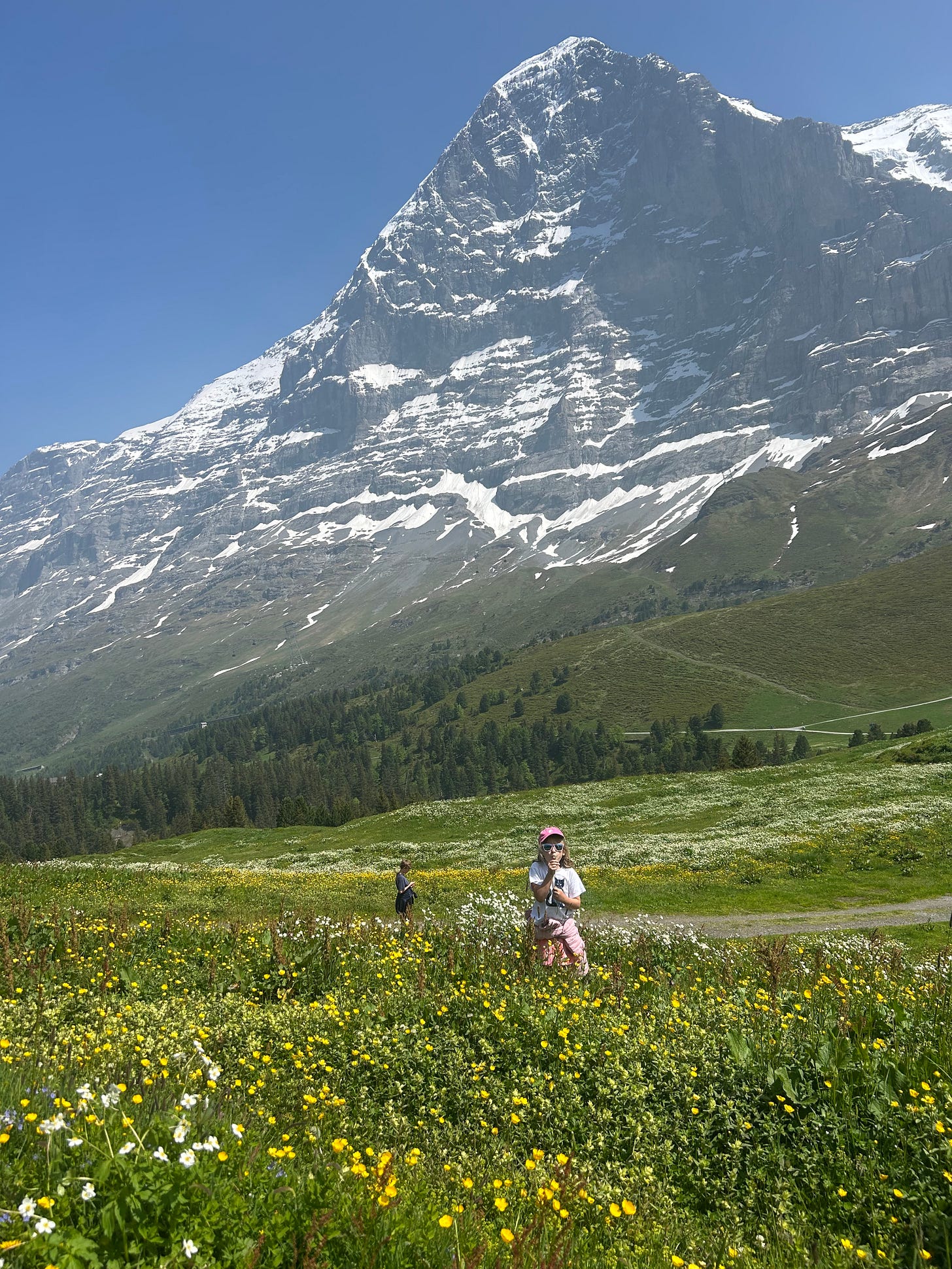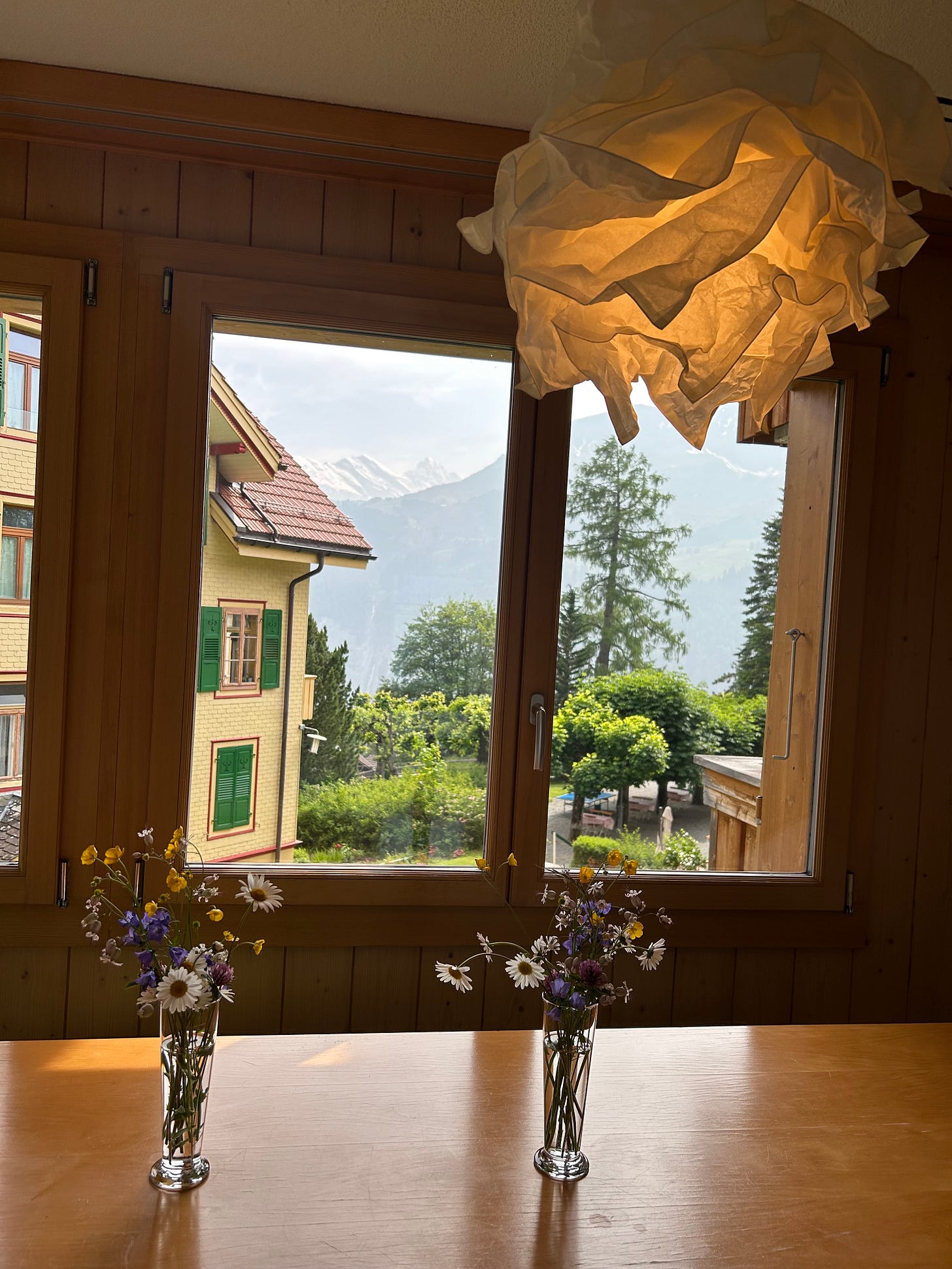“This will be a flat, easy hike,” is a lie that my otherwise principled husband likes to tell with stunning confidence. It became something of a catchphrase during the summers we worked at a camp in Wyoming, where Andrew was in charge of planning our weekly hikes.
“Flat as a parking lot” someone would say, quoting Andrew’s description of a trail from a previous week. The one that included a mile-long boulder field, some of it nearly vertical.
”Yes, just like last time,” someone else would say, rubbing their knee.
“No, really,” Andrew would insist. “This one is a gentle slope.”
It’s hard to know what the word easy means to Andrew. Or parking lot, for that matter.
He said it again a couple of weeks ago, on top of a mountain in Switzerland. We were vacationing in the Alps and had taken the lazy man’s way up the Männlichen, by way of a gondola, and had plans to hike down the famed Panorama Trail. This was billed as a family-friendly trail with stunning views and trails you might “push a stroller down.” It was only three miles long. Unfortunately, it was closed due to snow.
Andrew is very good at pivoting. ”We can take the Romantic Trail instead,” he said. “It’s two miles longer, but still mostly either downhill or flat.”
“Mostly?” I asked. I’ve learned to listen for the modifier. I want you to know that I’m not a wimp. I’ve got fairly good endurance after 18 years of Andrew’s flat, easy hikes, but we did have our three kids with us. And I do often get stuck in the back with the two whose “legs are falling off of their bodies,” and who “hate this vacation so much,” and who insist they would rather spend the night on this trail than walk one step further, and also do I have another snack in my backpack? What about now? Did I happen to go to the grocery store in the last half-mile? My endurance is less about what my leg muscles can handle, and more about how much whining I can deflect before it reaches my soul.
”Mostly,” Andrew said again. “There’s just a very short uphill walk at the end.”
I briefly considered what it might mean for the hard part to come at the end, but was quickly distracted by the view ahead of us. We had just shared a nice salami sandwich. The weather was a balmy 70 degrees. I had plenty of snacks, and the surrounding mountains were practically singing out to us.
To Andrew’s credit, the walk was mostly downhill and sometimes even flat. Actually, the walk was downright leisurely and consistently gorgeous. Mountains stood around us like watchful parents the entire way down, cradling us in their carpets of wildflowers. For a stretch, the kids even forgot about snacks. They sang! They pretended to be Heidi. If you’d happen to pass us, you may have mistaken them for the sunny Von Trapp children. We were happy. We were sinking into happiness, relaxing into joy like it was a pillow beneath us.
But then we reached the end. We had wound our way through a little meadow, taken a turn, and now faced the “short uphill walk” to the train station that would take us back to our village. By this point, we had walked nearly five miles. These were a pleasant five miles, yes, but they were still five miles using our actual legs.
”We have to climb that?” my middle child, Charlie asked, throwing his hand up to the sky where the path disappeared into the clouds. Normally, I’m quick to intervene and make light of situations, but I felt his question in my bones. I looked at this final stretch and it did not look short to me. “Uphill” was not even fair. It looked like someone had tilted the world to a 90-degree angle, covered it in gravel, and stripped away all the shade as a final insult.
”Look,” Andrew said, walking backwards, and breathing normally, “It helps if you zig-zag.” He demonstrated in case we had forgotten what zig-zagging looked like.
I turned to Charlie. “The only way out is through.” I said it to him and I said it to myself, “It will be over soon and you won’t even remember this part.” Which, of course, was a lie.
We zigged and we zagged. We cried. We swore we could not take another step, and then we did anyway.
At the top, we folded into ourselves, nearly dead and yet very proud almost-corpses. Andrew stood beaming. “Only a little bit more,” he said.
”Hmm?”
I looked past Andrew, and doggone-it if there wasn’t a replica of the hill we had just ascended towering behind his left shoulder.
”Where exactly are we going?” I asked Andrew, one tear sliding down my cheek.
”To the train station,” he reminded me, calmly.
”Can you point to it?” I asked. I needed proof that it existed.
He pointed to a building so far away it might have been a birdhouse. I might have squished it between my fingers like a giant. Oh, to have giants’ legs to carry me to that train station in the sky.
I don’t remember much of that last ascent. Just the feeling of collapsing onto a picnic table at the top. Andrew brought us each a treat— some mediocre ice cream— and we caught a train back to the village.
***
We are at the end of a four-week sabbatical from pastoring a small church we planted from scratch in 2020. Of course I don’t mean “we” apart from the Lord, or apart from our sending church, or apart from the many people who have come alongside us. But in another sense, I do mean “we.” A lot of the work has rightfully landed on our shoulders. It’s been the most exhausting five years of my life, and nothing else comes close. It has not been flat, nor easy.
Before the sabbatical, well-meaning people would understandably say that they hoped this time of rest would give us what we needed to get back to our calling. That makes sense. I know why people would say it. On this side of heaven, we rest so that we can get back to work. But that sure puts a lot of pressure on the act of resting. And is it even rest if it’s utilitarian? Does God’s economy work that way?
It doesn’t seem to be the way the world works. That lovely, leisurely walk through the wildflower-covered valley didn’t give me what I needed for the final steep climb. The strength I needed for that climb came from muscles I had built doing other hard, similar things. Work prepares us for more work. But when we rest, we build the type of endurance we need to rest.
Andrew did this through sketching. He sketched and painted his way through Europe. He drew doorframes, wildflowers, valleys and coastlines. He was working on his endurance to be still. He was training himself to receive God’s world exactly as it was given to Him.
***
While we were in Switzerland, we ran into a family from home. They happened to be staying in the same village as us, and so we made plans to meet up for dinner at a restaurant one night. But then I changed my mind: “Why don’t you just come to our place for dinner?”
After three weeks of travel, my muscle memory was telling me to do the same thing that I do at home: get people around my table. Andrew clipped some wildflowers and we arranged them in tall water glasses. We made cheese fondue, heated up grocery-store pizza, and squeezed eleven people around a small table to pour wine and break bread.
Of all the nights we had across Europe—three countries (four, if you count the Vatican) and five cities—this night glows in my memory. It came from the sort of rest that I had practiced at home. It was the restful act of laughing, of swapping stories, of passing around a salad bowl. We stretched out our feet into the deep rest of friendship, and friendship itself was the reward.
***
When people ask us how our sabbatical was, I hope I can be honest. If they ask whether it gave me what I needed to get back to work, I hope I’ll have the courage to say: no.
Because work builds muscles for more work. Affliction produces endurance. Trials give way for steadfastness.
But rest just teaches us how to rest.
“To be sure, food keeps us alive,” Robert Farrar Capon writes, in The Supper of The Lamb, "but that is only its smallest and most temporary work.” He is talking about food here, but he’s also talking about necessities of life verses what will follow us all the way Home. He continues:
[Food’s] eternal purpose is to furnish our sensibilities against the day when we shall sit down at the heavenly banquet and see how gracious the Lord is. Nourishment is necessary only for a little while; what we shall need forever is taste.
Yes, amen. Work is necessary only for a little while; What we shall need forever is sketches of doorways, walks under mountains, waterfalls and deep cut valleys. A vase of cut flowers on the table for you, and for me.








Elizabeth Harwell makes me want to write. Thank you for this feast, Elizabeth.
I was smiling the entire time I read this. I laughed out loud twice. What a gift.